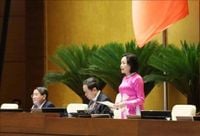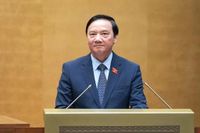The National Assembly of Vietnam has taken a significant step towards amending the 2013 Constitution, with Vice Chairman Nguyen Khac Dinh presenting a draft resolution during the ongoing ninth session of the 15th National Assembly on May 7, 2025. This draft resolution, established under Resolution No. 195/2025/QH15, aims to address various aspects of the constitutional framework, focusing on the Vietnam Fatherland Front, socio-political organizations, administrative units, and local government structures.
The proposed amendments comprise two articles. Article 1 features eight clauses that seek to revise and supplement existing regulations related to the Vietnam Fatherland Front and socio-political organizations, as well as the administrative units and local governance structures. Article 2 outlines three clauses that deal with the implementation and transitional provisions of the resolution.
In presenting the draft, Vice Chairman Dinh emphasized the importance of these amendments in ensuring that the Constitution reflects the will and aspirations of the people. He noted that the resolution is set to take effect on July 1, 2025, marking a pivotal moment in Vietnam's legal framework.
To facilitate public engagement in this constitutional revision process, the drafting committee has laid out a comprehensive plan to gather opinions from the populace, various sectors, and levels of government. This initiative aims to harness the collective intellect and commitment of the Vietnamese people, ensuring a broad consensus on the proposed changes.
As part of the amendments, the draft seeks to clarify the central role of the Vietnam Fatherland Front as a core organization in the national unity framework. This includes ensuring a legal basis for the restructuring of the Front and its affiliated socio-political organizations, thereby aligning with the new organizational model post-restructuring.
Moreover, the draft proposes modifications to Article 10 of the Constitution, which pertains to the Vietnam General Confederation of Labor. The amendments aim to assert the Confederation's role as the representative of workers at the national level in labor relations and international labor matters, reflecting the context of Vietnam's economic integration.
One of the notable aspects of the proposed amendments is the restructuring of administrative units. The draft specifies that Vietnam's administrative divisions will consist of provinces, centrally-run cities, and other administrative units beneath these levels, along with special economic-administrative units established by the National Assembly. The process for establishing, dissolving, merging, or dividing administrative units will be regulated by the National Assembly.
Furthermore, the amendments stipulate that there will be no elections for certain leadership positions, such as the Chairman and Vice Chairman of the People's Councils and the heads of various committees, in newly formed administrative units following the restructuring. Instead, appointments will be made by the National Assembly's Standing Committee and the Prime Minister based on notifications from relevant authorities.
Vice Chairman Dinh noted that these changes are designed to streamline the governance structure and enhance the efficiency of local government operations. By eliminating the administrative unit at the district level, the amendments aim to create a more agile and responsive local governance framework.
The proposed changes also suggest that the National Assembly will have the authority to define the types of administrative units below the provincial level and outline the procedures for their establishment and adjustment. This shift is intended to empower the legislative body in making decisions that directly impact local governance.
In addition to the structural changes, the draft resolution emphasizes the need for a clear legal framework to guide the functioning of local governments, particularly in the context of the ongoing administrative restructuring. This includes provisions for the organization of local governments, ensuring that they are equipped to meet the needs of their constituents effectively.
As the National Assembly continues its deliberations, the emphasis on public feedback reflects a commitment to inclusivity in the constitutional amendment process. The committee's outreach efforts aim to foster a sense of ownership among citizens regarding the constitutional changes that will shape Vietnam's future.
With the effective date set for July 1, 2025, the proposed amendments are poised to bring about significant transformations in Vietnam's governance structure. As the legislative body prepares for the finalization of the draft resolution, the focus remains on ensuring that the amendments resonate with the aspirations of the Vietnamese people.
In summary, the draft resolution presented by Vice Chairman Nguyen Khac Dinh marks a crucial step in Vietnam's constitutional evolution. By addressing key areas such as the role of the Vietnam Fatherland Front, the structure of local governance, and the representation of workers, these amendments aim to strengthen the legal framework and enhance the responsiveness of the government to its citizens.





